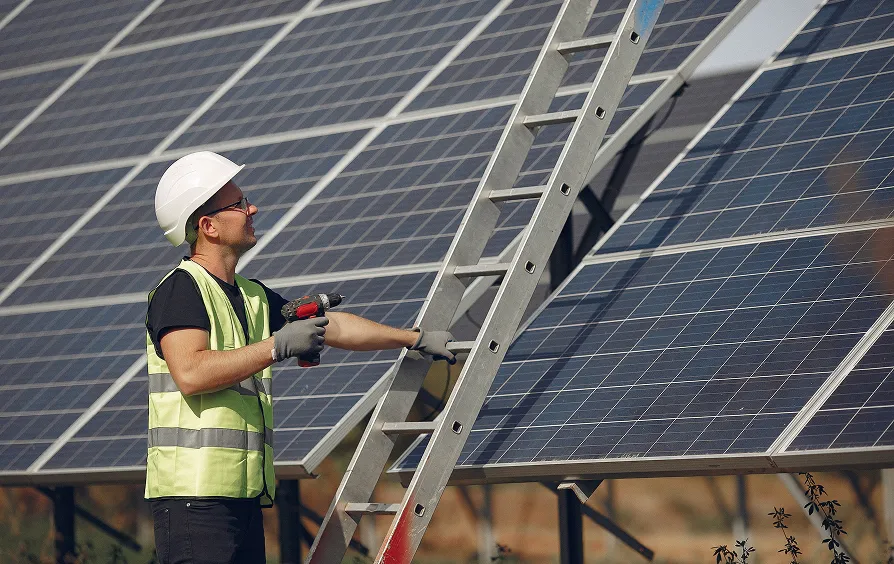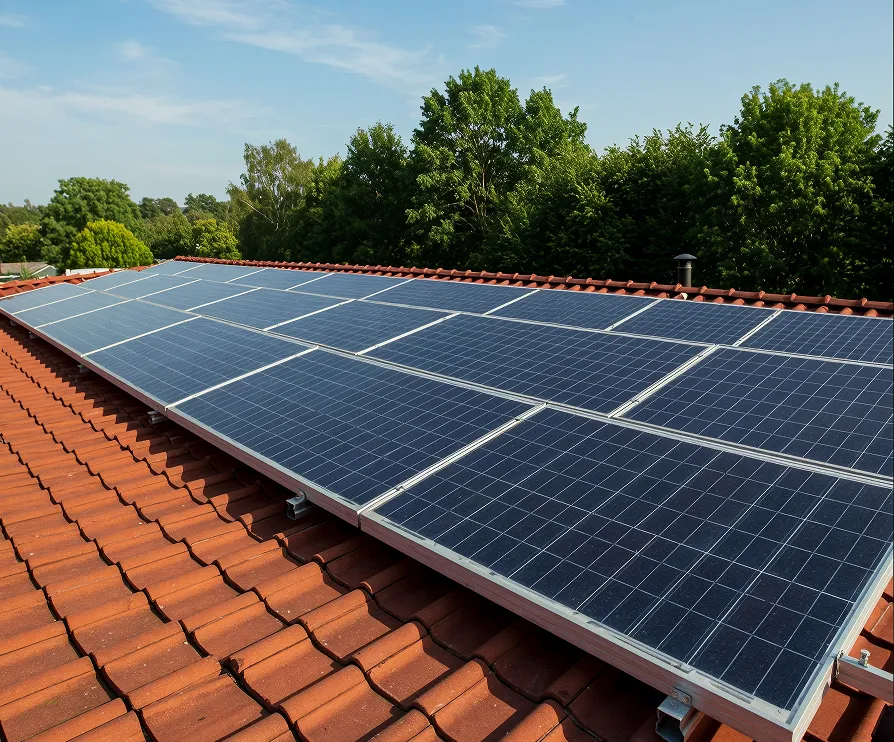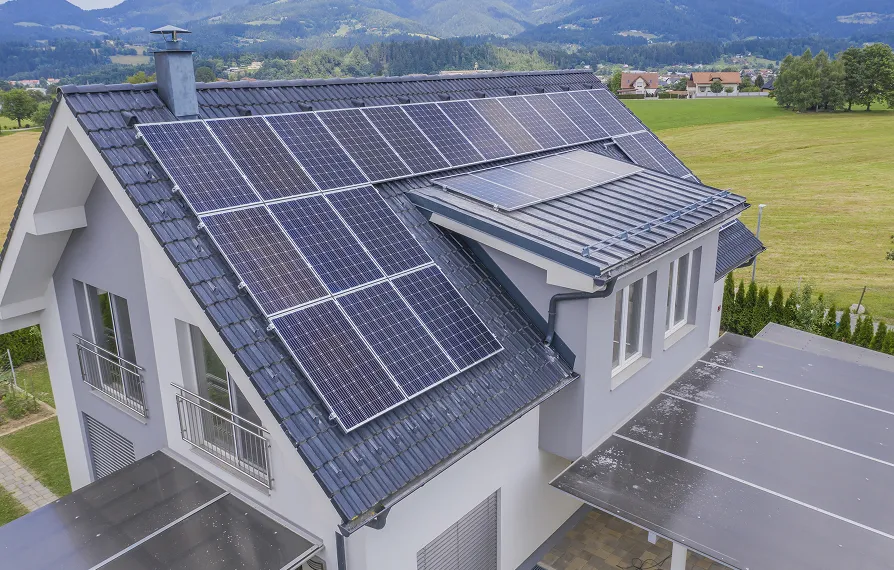Explore All
BROWSE BY CATEGORY
Interior
Exterior
Home Essentials
Homeowner Tools
Blogs & Guides
Find a Pro
Book Your Appointment Now
Home Essentials
About Renovize Home
Explore All
BROWSE BY CATEGORY
Interior
Exterior
Home Essentials
Homeowner Tools
Blogs & Guides
Find a Pro
Book Your Appointment Now
Home Essentials
About Renovize Home
Last Updated on June 25, 2025
As energy prices continue to rise and climate concerns grow, homeowners across the U.S. are choosing solar power. It offers a clean, cost-effective alternative that delivers long-term savings and supports a more sustainable future.
But with so many companies offering solar panels, system installation, and add-ons, choosing the right provider can be overwhelming. This guide will help you understand solar energy services, evaluate providers, and make an informed choice that delivers long-term savings and sustainability.

Table of Contents
Understanding the Importance of Solar Energy Services
Types of Solar Services Offered by Contractors
Benefits of Professional Solar Services
How the Solar Installation Process Works
Factors to Consider When Choosing a Solar Company
Costs and Savings of Going Solar
Common Myths About Solar Services
How to Find the Best Solar Service Providers Near You
Ending Views
Solar energy is more than just a sustainable trend—it is a smart, long-term investment that benefits your home, finances, and the environment. With proper installation, solar panels can reduce utility bills and increase energy independence.

Evaluating your roof and surroundings ensures the system receives optimal sunlight for maximum efficiency.
Tailored solar setups match your energy needs, roof structure, and home orientation.
A professional contractor handles all permitting and ensures the system meets local building codes.
Proper integration with your home's electrical system ensures safety, reliability, and peak performance.
Ongoing support helps track system output, detect issues early, and maintain long-term efficiency.
Poor installation or poorly matched systems can reduce efficiency and create safety risks. That’s why hiring a certified solar contractor is key to getting lasting results and maximum energy savings.
Top solar providers offer a full range of services to support homeowners at every stage of their solar energy journey.

This is the core of solar services. Certified technicians install photovoltaic (PV) panels on your roof or property to capture sunlight and convert it into usable electricity. System design is tailored to your home’s orientation, energy needs, and local sunlight availability.
Adding battery storage allows you to store excess power generated during the day and use it at night or during power outages. Systems like Tesla Powerwall or LG Chem increase energy independence and grid flexibility.
Routine maintenance helps ensure panels remain clean and function at peak performance. Monitoring systems track energy output, notify of issues, and help assess return on investment.
Solar panels are durable, but over time, issues may arise—like wiring faults, microcracks, or inverter failure. A solar service provider can troubleshoot, repair, or upgrade older systems.
Many solar companies now offer electric vehicle (EV) charger installation integrated with your solar system, allowing you to charge your vehicle at home using clean energy.
Working with a certified solar contractor provides long-term value, peace of mind, and optimal system performance. Professional installation helps you avoid costly mistakes and ensures you get the full return on your investment.

Professionals assess your roof orientation and shading to design a system that captures the most sunlight year‑round.
Licensed contractors manage all permits and ensure the installation meets local building codes.
Experts coordinate with utility companies to set up net metering and connect your system to the grid safely.
Certified installations come with manufacturer and labor warranties to protect your investment.
Professionals help you apply for local, state, and federal incentives to lower your upfront costs.
DIY or budget installations often lead to poor system performance, voided warranties, or even structural damage. With professional service, you receive expert guidance, safer installation, and reliable energy savings.
Understanding the solar installation process helps you make informed decisions and ensures a smooth experience from start to finish. Here’s what to expect at each stage:

A technician will inspect your roof, check its angle, structural integrity, and assess how much sunlight your home receives. They’ll also review your past energy bills to determine how much power your system needs to produce.
Based on your energy use and location, the company creates a system layout. This includes:
You’ll receive a detailed proposal and cost breakdown.
The contractor secures necessary permits, utility approvals, and handles code compliance. This process varies by state and local municipality and may take 1–4 weeks.
Certified electricians and installers mount the panels, connect the wiring, and integrate the system with your home’s electrical panel and the utility grid.
After installation, a final inspection is conducted. Once approved, your system is activated and begins producing power—typically within 24 to 72 hours after inspection clearance.
Selecting the right solar provider is key to maximizing your system’s performance, longevity, and return on investment. Here are the most important factors to evaluate before making your decision.

Ask about mobile or web-based monitoring tools that provide:
Although solar installation requires an upfront investment, the long-term financial benefits often outweigh the initial cost. Homeowners typically recover expenses through energy savings, tax credits, and local incentives over time. Solar energy not only helps reduce utility bills but also increases property value and provides a buffer against rising energy costs.

The average cost of a residential solar panel system after applying the 30% federal tax credit falls between $12,000 and $25,000. This cost can vary depending on:
Most homeowners recover their initial investment within 6 to 10 years through reduced monthly energy bills. Additional factors that influence the payback period include:
Over a typical 25–30 year lifespan of solar panels, homeowners can save $15,000 to $40,000 or more, depending on local utility rates and system size. These savings are compounded when combined with energy-efficient home upgrades, such as insulation and smart thermostats.
Many homeowners hesitate to go solar due to common misconceptions. Here are some of the most frequent myths, and the truth behind them.

| Myths | Truth |
|---|---|
| Solar Only Works in Sunny States | Modern solar panels are highly efficient and work well even in cloudy or overcast regions. |
| It’s Too Expensive Without Incentives | Many solar providers offer $0-down financing, making solar affordable without upfront costs. |
| Solar Panels Will Damage My Roof | When installed by licensed professionals, solar panels are securely mounted and can actually help protect roof sections from wear and weather exposure. |

Begin by searching phrases like “best solar companies near me” or “licensed solar installers in [your city].” Focus on trusted websites that allow you to compare different providers, read customer reviews, check certifications, and get a sense of average costs in your area.
Speak to neighbors or friends who’ve gone solar. Their experience with the contractor’s quality, professionalism, and savings can be invaluable.
Compare 2–3 offers. Don’t just focus on the cost. Check the equipment quality, guarantees, support, and overall benefits:
Solar services are more than just panel installation—they’re a gateway to cleaner energy, greater independence, and long-term financial savings. By working with a licensed, experienced solar provider, you gain access to high-efficiency products, expert design, financing options, and peace of mind.
The right solar contractor helps you understand your system, manage your energy use, and make smart decisions tailored to your lifestyle and location. Whether you're ready to invest now or just beginning your research, exploring professional solar energy services is a step toward a more sustainable future.
Join our mailing list for exclusive updates, expert tips, and special offers tailored to your needs. Be the first to know about the latest in home services.


Renovize Home is a platform that supports homeowners from planning to renovation. Whether it’s Renovize AI for guidance or a one-on-one call with Pro Finder, we understand your project and match you with local contractors tailored to your needs.
Who We Are
About Renovize HomeGet in TouchHomeownwer Support:
Coming Soon!
General Inquiries:
support@renovizehome.com
Head Office:
24 Greenway Plaza, STE 1800M, Houston, TX 77046.